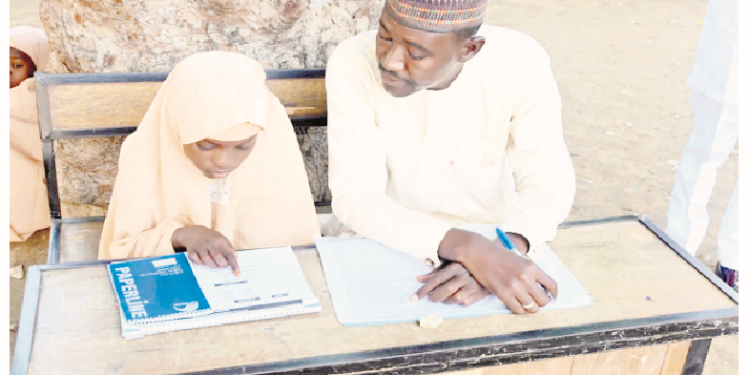Even before the onset of the COVID-19 pandemic, children globally reported poor foundational reading and maths skills. Most children in Sub-Saharan Africa, including Nigeria, also experienced this learning crisis that worsened due to prolonged school closures and other disruptions to the education system during the pandemic.
By reading this article, you are demonstrating your ability to read. By calculating how much change you need when purchasing something at the shop, you draw on your ability to do maths. Text and numbers are everywhere: on newspapers, road signs, advertisements, subtitles in movies, contractual agreements, bank statements, and emails from co-workers. Beyond foundational skills’ ability to revolutionalise how you navigate the world, these skills will also allow children to absorb more advanced content within the curriculum. Without this base, they fall behind and never catch up. Despite how essential reading and arithmetic are to experiencing and navigating the world, many children in Nigeria are not acquiring these skills in school.
According to The State of Global Learning Poverty 2022 update, 70 percent of 10-year-old children in low and middle-income countries cannot read a simple text with comprehension. The situation is similarly dire in Nigeria, with many young learners unable to read, write and perform basic numeracy activities. A survey conducted in 2020 by the Nigeria Education Data Survey (NEDS) reported that only 66.8 percent of children aged 12 to 14 could read at least one of three words, and only 67.3 percent of children of the same age group could add single-digit- sums.
The Ministry of Education recently reiterated that it is committed to continually adopting existing and emerging innovations that advance learning. Evidence-based approaches that will accelerate the learning of foundational skills, such as Teaching at the Right Level (TaRL), are more critical now than ever. The TaRL approach, pioneered by Pratham and evaluated and refined for over 15 years in India in collaboration with Abdul Latif Jameel Poverty Action Lab (J-PAL), is an accelerated learning approach that ensures that children catch up on foundational literacy and numeracy before they complete primary school. Since 2016, TaRL Africa, has been supporting TaRL pilots and scale-ups across over ten countries in Africa. In Nigeria, TaRL Africa has partnered with various governmental and non-governmental actors to support TaRL programmes in seven states, namely Adamawa, Bauchi, Borno, Kaduna, Kano, Kebbi, and Yobe.
Teaching at the Right Level (TaRL) zeroes in on classroom practices, enabling and motivating teachers to ensure all learners attain basic literacy and numeracy skills. Children are assessed using a simple testing tool at the classroom level and then grouped according to their learning level rather than their age or grade, creating an environment where level-appropriate content is quickly learned. For a period of the day, children in middle-upper primary focus on foundational skills using a specific accelerated learning methodology, providing children with an opportunity to catch up.
TaRL programmes in Nigeria are embedded within the government system and leverage its human and material resources to foster sustainability and to scale. In collaboration with the government and partners, programmes are designed to ensure cost-effectiveness and strengthen the capacity of government personnel from school to the state level on foundational learning. In Kebbi state, for example, the state government has also committed its financial resources to pilot, sustain and scale up the programmes. TaRL is now being implemented in approximately 2000 schools across the seven states in Nigeria.
Personally, it is very inspiring to see the excitement on children’s faces as they learn using fun and interactive activities and as they make leaps of progress from being able to identify letters only to reading words and short stories within a short period in a TaRL classroom.
To improve learning outcomes in Nigeria and ensure children gain foundational skills, we need collective leadership working together at all levels—in schools, government, and communities to drive foundational learning. Firstly, this commitment needs to be augmented with practical and concrete action and evidence-based plans that advance accelerated learning and recovery of the lost learning time due to COVID-19 school closures.
Secondly, the government must recruit, train and motivate teachers to ensure that all children, including the most marginalized, can access quality learning. The government must support teachers with adequate tools, professional development opportunities, and ongoing mentoring support to deliver targeted instruction so that no child is left behind.
Thirdly, the language of instruction must be brought to the forefront of education policy discussions, as evidence demonstrates that teaching children in a language they use and understand at home has the potential to support the development of foundational skills.
Additionally, the government must increase access to accelerated learning interventions that have been proven to support children in catching up. The TaRL approach has been identified by the Global Education Evidence Advisory Panel approach as a “good buy” on cost-effective approaches that are improving global learning. The government must assess learning levels regularly and prioritize teaching the fundamentals to enable all children to reach their full potential and participate in society.
– Umoren is TaRL Africa’s Nigeria Country Manager based in Abuja, Inyang Umoren @inyangumoren/Twitter



